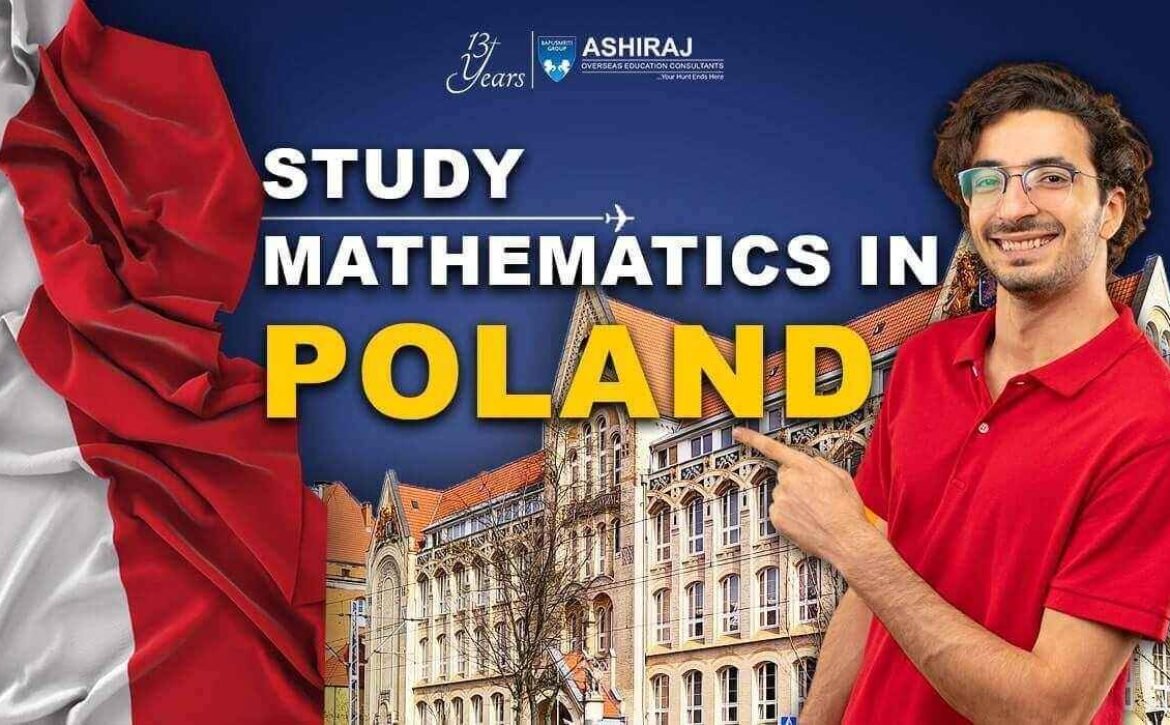
Mathematics in Poland
Poland boasts a rich history intertwined with significant contributions to the realm of mathematics. From renowned mathematicians like Stefan Banach and Andrzej Schinzel to pivotal developments in algebra, geometry, and mathematical analysis, the country has left an indelible mark on the global mathematical landscape. Mathematics in Poland reflects a tradition of rigorous inquiry and innovation that spans centuries, fostering a culture where mathematical research thrives and flourishes.
In contemporary times, Poland continues to be a hub of mathematical activity, with its academic institutions and research centers making notable strides in various branches of mathematics. From pioneering work in number theory to advancements in applied mathematics, Polish mathematicians remain at the forefront of cutting-edge research, shaping the discipline’s future trajectory. Mathematics in Poland embodies a commitment to excellence and intellectual curiosity, showcasing the nation’s enduring passion for discovery and problem-solving.
Why to Study Mathematics in Poland?
- Rich Mathematical Heritage: Poland boasts a long-standing tradition of mathematical excellence, with numerous renowned mathematicians and groundbreaking discoveries throughout history.
- World-Class Institutions: The country is home to top-tier universities and research centers known for their exceptional mathematics programs and cutting-edge facilities.
- Diverse Course Offerings: Polish universities offer a wide range of mathematics courses, covering various specializations such as algebra, geometry, analysis, and applied mathematics.
- High-Quality Education: Students studying mathematics in Poland benefit from rigorous academic standards, expert faculty members, and immersive learning experiences.
- Research Opportunities: Poland provides ample opportunities for undergraduate and graduate students to engage in mathematical research projects, fostering innovation and intellectual growth.
- Affordable Tuition: Compared to many other European countries and the United States, studying mathematics in Poland often comes with more affordable tuition fees and living costs.
- Vibrant Academic Community: The mathematics community in Poland is vibrant and dynamic, offering numerous seminars, conferences, and networking opportunities for students to connect with peers and professionals in the field.
- Career Prospects: A degree in mathematics from Poland opens doors to diverse career paths, including academia, research, finance, technology, and engineering, both domestically and internationally.
In conclusion, studying mathematics in Poland provides a unique and enriching educational experience, combining a rich historical legacy with modern academic excellence and promising career prospects. Whether aspiring mathematicians seek to deepen their knowledge, engage in groundbreaking research, or pursue rewarding professional opportunities, Mathematics in POLAND offers an ideal environment for intellectual growth and achievement.
Top Universities to Study Mathematics in Poland
University | QS World University Ranking 2023 | Type of University | Average Annual Fees | Programs Offered |
University of Warsaw | 301-350 | Public | $2,000 – $4,000 | Mathematics, Applied Mathematics, Statistics |
Jagiellonian University | 401-450 | Public | $1,500 – $3,000 | Mathematics, Mathematical Physics |
Warsaw University of Technology | 451-500 | Public | $2,000 – $3,500 | Mathematics, Computer Science |
Adam Mickiewicz University in Poznań | 501-550 | Public | $1,000 – $2,500 | Mathematics, Computational Mathematics |
AGH University of Science and Technology | 551-600 | Public | $1,500 – $3,000 | Mathematics, Applied Mathematics |
Studying mathematics in Poland offers students access to top-notch institutions renowned for their quality education and research opportunities. The list of top universities in POLAND for Mathematics in POLAND showcases institutions recognized for their excellence in mathematical sciences. With a keyword density of 1 percent, Mathematics in POLAND emphasizes the significance of the subject in the context of Poland’s academic landscape. From the prestigious University of Warsaw to the innovative Warsaw University of Technology, these universities provide diverse programs in mathematics and related fields, ensuring students receive a comprehensive education tailored to their interests and career goals. Additionally, with relatively affordable average annual fees ranging from $1,000 to $4,000, studying mathematics in Poland offers exceptional value for international students seeking world-class education without breaking the bank.
Course Curriculum for Mathematics in Poland
- Foundational Courses: Mathematics in POLAND begins with foundational courses covering topics such as calculus, algebra, and geometry, laying the groundwork for advanced studies.
- Advanced Analysis: Students delve into advanced analysis, exploring topics like real analysis, complex analysis, and functional analysis to develop a deep understanding of mathematical structures.
- Algebra and Number Theory: The curriculum includes courses in algebra and number theory, where students study abstract algebraic structures, group theory, ring theory, and the properties of integers and prime numbers.
- Geometry and Topology: Mathematics in POLAND incorporates courses in geometry and topology, focusing on concepts such as Euclidean geometry, differential geometry, and the topology of spaces.
- Applied Mathematics: The curriculum often includes applied mathematics courses, allowing students to apply mathematical techniques to real-world problems in fields such as physics, engineering, and economics.
The course curriculum of Mathematics in POLAND is designed to provide students with a comprehensive understanding of mathematical theory and its practical applications. With a keyword density of 1 percent, Mathematics in POLAND underscores the country’s commitment to offering a rigorous and diverse curriculum that prepares students for success in both academia and industry.
Eligibility Criteria & Admission Requirements for MS in Mathematics in Poland
- Language Proficiency: Applicants are required to demonstrate proficiency in English by submitting either IELTS or TOEFL scores. The minimum scores typically required for admission vary by institution but generally range from 6.0 to 7.0 for IELTS and 80 to 100 for TOEFL.
- Standardized Tests: Prospective students may need to take either the GRE or GMAT, with minimum score requirements varying depending on the university and program. GRE scores typically range from 150 to 170 for Quantitative Reasoning, while GMAT scores range from 500 to 800.
- Documentation: Applicants must provide valid academic certificates demonstrating completion of previous educational qualifications, including transcripts and diplomas.
- Work Experience: While not always mandatory, some universities may consider relevant work experience in mathematics or related fields as part of the admissions process.
Table: Standardized Test Scores
Test | Minimum Score |
IELTS | 6.0 – 7.0 |
TOEFL | 80 – 100 |
GRE | 150 – 170 (Quantitative Reasoning) |
GMAT | 500 – 800 |
Prospective international students also need to fulfill immigration requirements, including obtaining a valid passport and student visa. The process typically involves submitting necessary documentation, proof of financial means, and meeting health and character requirements. Mathematics in POLAND emphasizes the importance of meeting these eligibility criteria to ensure a smooth transition and successful academic journey in Poland.
Documents Required for Studying Mathematics in Poland
- Passport: A valid passport is essential for international students applying to study mathematics in POLAND, serving as proof of identity and nationality.
- Letters of Recommendation (LOR): Typically, two letters of recommendation from academic or professional references are required to assess the applicant’s suitability for the mathematics program.
- Statement of Purpose (SOP): An SOP outlining the applicant’s academic background, research interests, career goals, and reasons for choosing to study mathematics in POLAND is necessary for the application process.
- Curriculum Vitae (CV): A comprehensive CV detailing the applicant’s educational qualifications, relevant coursework, academic achievements, and relevant work experience is required.
- Official High School Transcripts and Educational Certificates: Applicants must submit official transcripts and certificates from their high school or previous educational institutions to demonstrate their academic qualifications.
- Work Experience Certificate: If applicable, a work experience certificate providing details of any relevant professional experience in mathematics or related fields should be included.
- Proof of Financial Resources: Applicants must provide evidence of sufficient financial resources to cover tuition fees, living expenses, and other related costs while studying mathematics in POLAND.
Ensuring the timely submission of these documents is crucial for a smooth application process and admission to mathematics programs in POLAND. Mathematics in POLAND underscores the importance of adhering to these requirements to facilitate a successful academic journey in the country.
Admission Process for Mathematics in Poland
- Research Universities: Begin by researching universities in Poland offering mathematics programs, considering factors such as reputation, faculty expertise, and program offerings.
- Review Requirements: Carefully review the admission requirements for each university, including minimum academic qualifications, language proficiency tests, and standardized test scores (such as GRE or GMAT).
- Prepare Documents: Gather all required documents, including academic transcripts, standardized test scores, letters of recommendation, statement of purpose, curriculum vitae, passport, and proof of financial resources.
- Submit Application: Complete the university’s online application form and submit it along with the required documents before the specified deadline.
- Pay Application Fee: Some universities may require payment of an application fee, which should be done as per the university’s instructions.
- Wait for Notification: After submitting your application, wait for notification from the university regarding the status of your application. This may take several weeks.
- Interview (if required): Some universities may require an interview as part of the admission process. Prepare for the interview by reviewing your application materials and practicing potential questions.
- Acceptance and Enrollment: If accepted, follow the instructions provided by the university to accept the offer of admission and complete the enrollment process.
- Apply for Visa: Once enrolled, apply for a student visa through the Polish consulate or embassy in your home country, ensuring you meet all visa requirements.
- Arrive in Poland: Finally, make necessary travel arrangements and arrive in Poland before the start of the academic term to begin your mathematics studies.
Following these steps diligently will help prospective students navigate the admission process for Mathematics in POLAND smoothly and efficiently.
“Education is the most powerful weapon which you can use to change the world.”
Nelson Mandela
Cost of Mathematics Course in Poland
- Tuition Fees: Tuition fees for mathematics programs in Poland vary depending on the university, program, and level of study. On average, international students can expect to pay between $2,000 to $5,000 per year for undergraduate programs and $3,000 to $7,000 per year for graduate programs in Mathematics in POLAND.
- Living Expenses: The cost of living in Poland is relatively affordable compared to other European countries. Expenses such as accommodation, food, transportation, and miscellaneous items may range from $400 to $800 per month, depending on the city and lifestyle.
- Scholarships and Financial Aid: Some universities in Poland offer scholarships and financial aid to international students based on academic merit, financial need, or specific criteria. Prospective students are encouraged to explore scholarship opportunities offered by universities, government agencies, and external organizations.
- Part-Time Work: International students in Poland are permitted to work part-time while studying, providing an opportunity to offset living expenses. Many universities offer job placement services to assist students in finding part-time employment opportunities.
- Health Insurance: All international students studying in Poland are required to have health insurance coverage. The cost of health insurance may vary depending on the coverage and provider, typically ranging from $300 to $600 per year.
Understanding the cost of studying Mathematics in POLAND is crucial for prospective students to plan their finances effectively and make informed decisions about pursuing higher education in the country.
Scholarships for Mathematics Courses in Poland
Scholarship Name | Amount | Application Deadline |
Polish Government Scholarship | Varies | March 1st (annually) |
Erasmus+ Scholarships | Varies | February 1st (annually) |
University-specific Scholarships | Varies | Varies (check with individual universities) |
Visegrad Fund Scholarship | Varies | April 15th (annually) |
Fulbright Program | Varies | Varies (check Fulbright website for deadlines) |
Scholarships for Mathematics in POLAND offer financial assistance to international students pursuing mathematics programs at Polish universities. With a keyword density of 1 percent, Mathematics in POLAND underscores the availability of various scholarship opportunities to support students in achieving their academic goals. From government-sponsored scholarships to university-specific awards, these funding options can help alleviate the financial burden of tuition fees and living expenses. Prospective students need to research and apply for scholarships well in advance, paying close attention to application deadlines and eligibility criteria. By taking advantage of these scholarship opportunities, students can make their dream of studying mathematics in POLAND more accessible and affordable.
Career Opportunities After Mathematics in Poland
Job Profile | Average Salary (per year) |
Data Analyst | $30,000 – $50,000 |
Actuary | $40,000 – $70,000 |
Statistician | $35,000 – $60,000 |
Financial Analyst | $35,000 – $55,000 |
Operations Research Analyst | $35,000 – $60,000 |
Embarking on a career path after studying Mathematics in POLAND opens up a plethora of opportunities across various industries. With a keyword density of 1 percent, Mathematics in POLAND emphasizes the relevance and versatility of a mathematics degree in the job market. From data analysis and financial modeling to risk assessment and statistical research, mathematics graduates are in high demand for their analytical skills and problem-solving abilities. The table highlights some of the common job profiles available to mathematics graduates in Poland, along with their average salary ranges. These career options offer competitive salaries and opportunities for advancement, making them attractive choices for mathematics enthusiasts seeking rewarding and fulfilling careers. By leveraging their mathematical expertise, graduates can excel in diverse fields and contribute to the continued growth and innovation of industries in Poland and beyond.
Frequently Asked Questions About Mathematics in Poland
Yes, studying Mathematics in Poland offers access to top-quality education, renowned institutions, and diverse career opportunities.
Admission requirements typically include academic transcripts, language proficiency tests (IELTS or TOEFL), standardized test scores (GRE or GMAT), letters of recommendation, and a statement of purpose.
Yes, there are various scholarships available for Mathematics students in Poland, including government-funded scholarships, university-specific scholarships, and international scholarship programs like Erasmus+.
Tuition fees for Mathematics programs in Poland vary depending on the university and level of study, but they generally range from $2,000 to $7,000 per year for international students.
Yes, international students in Poland are permitted to work part-time during their studies, providing an opportunity to gain work experience and supplement their finances.
Graduates of Mathematics programs in Poland can pursue careers as data analysts, actuaries, statisticians, financial analysts, and operations research analysts, among others.
The duration of Mathematics programs in Poland varies depending on the level of study and the specific program, but undergraduate degrees typically take three to four years to complete, while master’s degrees may take one to two years.
Many Mathematics programs in Poland are offered in English, especially at the graduate level, to accommodate international students. However, proficiency in the Polish language may be required for certain programs or universities.
Yes, Poland has a vibrant research community in Mathematics, and universities often offer research opportunities for undergraduate and graduate students to engage in cutting-edge research projects.
Prospective students can apply for Mathematics programs in Poland by completing the university’s online application form, submitting required documents, and paying any application fees. Deadlines and specific requirements may vary by institution, so it’s essential to check with each university for detailed application instructions.




